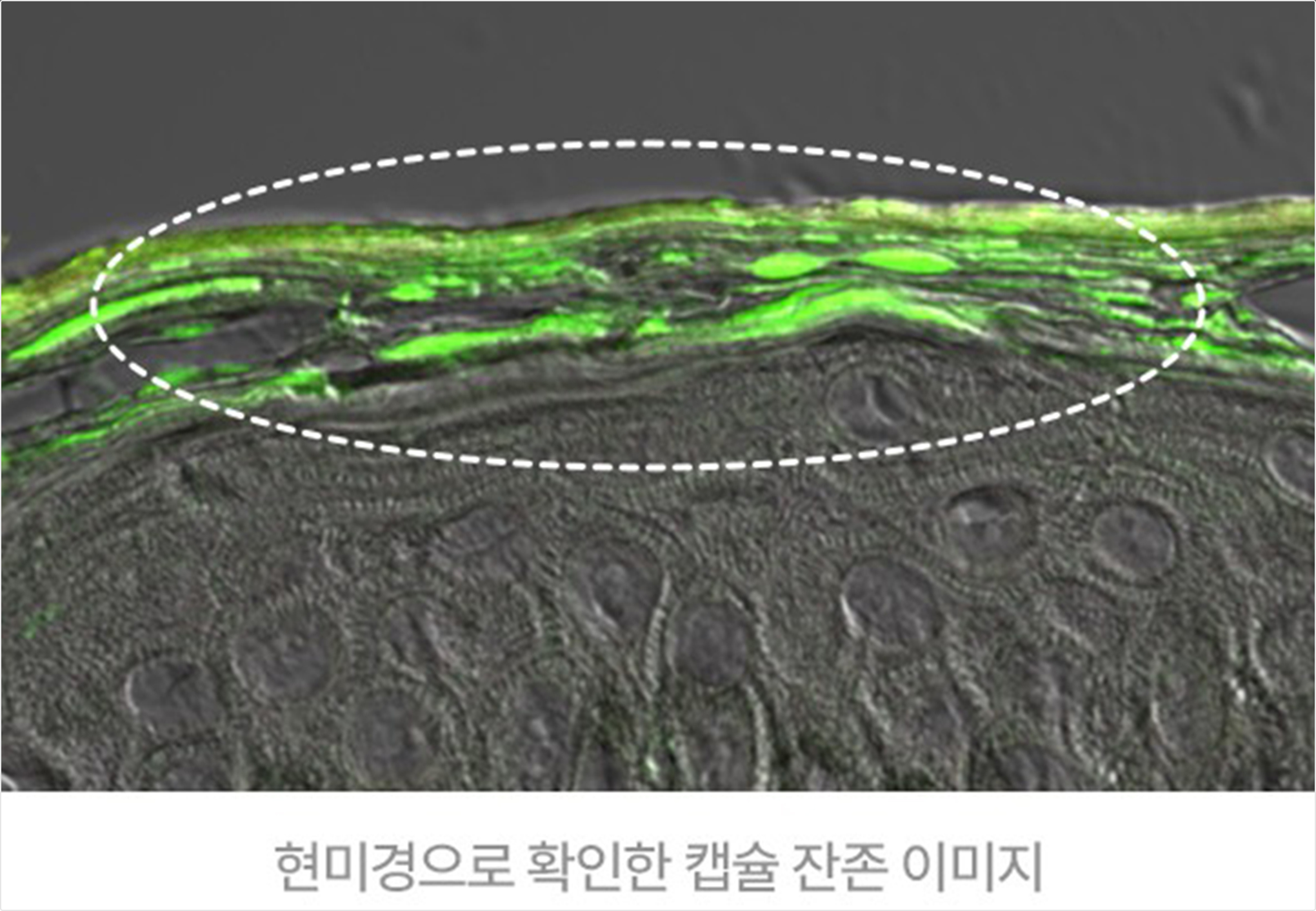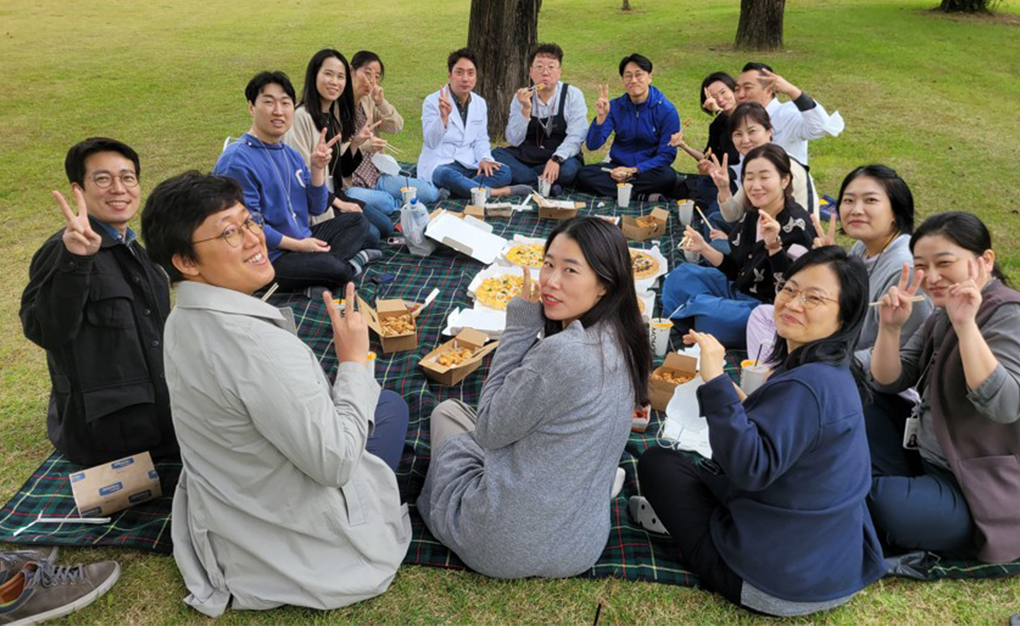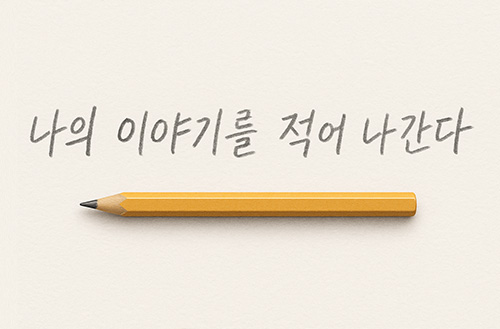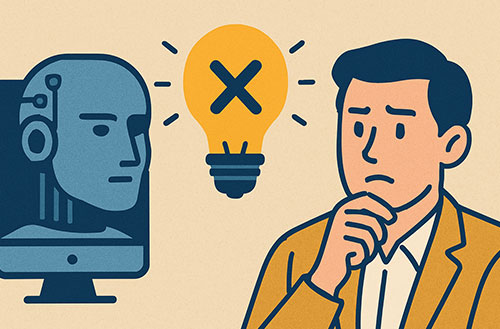


Columnist
Yongjoo Na R&I Center Innovation Management Office
#INTRO
Hello everyone. I’m Yongjoo Na from the R&I Innovation Management Center, joining you as a new columnist. I’ve always written to sort through and expand my thoughts from the experiences that surround me. Naturally, I’ve spent much time contemplating what makes me “me.” Through this opportunity, I’d like to share conversations with you, readers—sometimes from the perspective of an R&I researcher, other times as an ordinary colleague—going beyond my personal reflections. I hope my writing allows you to reconsider what makes you “you” and how to preserve that.
1 I Was a Researcher Who Guarded ‘What’s Mine’
Have you ever noticed the phrase ‘in vitro efficacy only’ on product pages promoting skincare benefits?
(in vitro: Latin for ‘in glass’—experiments using cells in an artificial environment outside the body, such as in test tubes)

Source: product detail page
in vitro research example: imaging evaluation using skin tissue.

Source: product detail page
Small print showing in vitro test results.
These days, I mainly handle portfolio management and project operations at the research center, but I once led the Claim Substantiation Team at the Advanced Beauty Research Institute—the team responsible for proving those claims. Working with them, I often witnessed something that personally puzzled me. It was how everyone would always say things like ‘I’ll do it’ or ‘Use mine.’
While we’re all used to working together in teams or labs at the company, the actual work of conducting experiments is essentially an individual domain. The typical process involves carrying out your assigned experiments from start to finish on your own. In a way, researchers work “together, yet very much on their own.”
For those unfamiliar with research and lab work, let me explain. To conduct experiments, you need materials—various chemicals called reagents, skin cells, and other supplies. There are shared reagents everyone uses, but most of what sits on your lab bench is personal supplies. Here’s a rather funny episode from my graduate school days: one senior researcher would mark their reagents with cryptic labels—letters or codes only they could decipher—to keep others from using them. In other words, lab supplies carry a strong sense of ‘ownership.’ Not because they’re difficult to prepare or particularly rare, but simply because sharing them isn’t something we’re used to.
As with everything in life, experiments don’t always go according to plan. Sometimes you come in after preparing everything the day before, only to find your cells contaminated for unknown reasons, and you’ve lost an entire day’s work. Contaminated cells have to be discarded and prepared from scratch. When even cells you’ve cultivated yourself can’t always be trusted, it’s not easy to accept cells grown by someone else and use them in your experiments. What if the results don’t turn out right? You can’t exactly complain to the generous colleague who shared their cell with you. The same goes for helping someone else with their experiments. Experimental procedures are complex, and one small misstep can ruin the final results. I held a strong belief that ‘my experiments are mine’ and ‘someone else’s experiments are theirs.’ Whether things went well or poorly, it was my responsibility.
Because of that mindset, I wasn’t comfortable sharing experimental materials (reagents, cells, or equipment) with others. Trusting and using someone else’s materials was even harder. Maybe saying I wasn’t comfortable is just an excuse. Perhaps the more honest truth is that I simply didn’t trust them.
Even so, my team members would help their colleagues after finishing their own experiments, readily share the cells they’d been cultivating, and just as easily accept and use those shared cells in their work. Here’s a slightly different example: when growing cells, you sometimes need to come in on weekends to check on them, depending on their growth stage. Even then, one person would come in and take care of everyone else’s cells—making sure they grew properly and were ready for experiments. From where I stood, I couldn’t stop thinking, “That’s nice, but... why?”
2 Beyond Trust: Consideration and ‘Our Authentic Way’
Joining an established team as its leader only made me more curious about the ‘natural collaboration’ I was witnessing. Through individual meetings with team members, I finally understood why. It came down to the nature of our work — we were essentially one team, moving together toward the same goal. Product launch schedules were firmly set, and the volume and quality of required deliverables kept rising. The experiments we conducted to meet specific deadlines and deliver quality results weren’t just one person’s responsibility—they were challenges for the entire team.
Of course, everyone still had to complete their individually assigned tasks faithfully. The team members, all experts in experimentation and research, generally handled this well. But when unexpected situations arose—when experiments that urgently needed results weren’t working out, or when cells were suddenly needed—it didn’t matter whose experiment it was. We had to join forces. That’s when team members would ask each other for help, and anyone who could lend a hand would gladly do so. Watching this ‘solving things together’ system operate so naturally felt both familiar and unexpectedly refreshing.
“The most important thing in human relationships is not negating the other person.” (from How to Have Conversations Where No One Gets Hurt by Kentaro Hayashi)
The author argues that simply not negating others is several times better than praising, affirming, or even scolding them. In life, we’re far more likely to start by negating what others say and do. I’m not talking about simply expressing that ‘my thinking is different’—I mean actually dismissing or ignoring other people’s opinions. But what I observed in my colleagues went beyond just not negating others.
Until then, I’d never imagined doing someone else’s research for them, but watching their approach gradually shifted my thinking from ‘I just need to protect my own work.’
I’d thought this behavior was about trust. But as I’ve written and reflected on it, I’ve come to realize it requires something beyond simple trust—it requires genuine consideration. After all, who actually enjoys coming in on weekends? Just showing up for a few hours to care for cells isn’t easy. And in principle, everyone’s supposed to take care of their own things. So when one person comes in and tends to everyone else’s cells too, it might seem like a small thing. Yet it’s actually quite difficult without the deep bonds they share—without real consideration and understanding for their colleagues.
Watching my colleagues look out for each other and share their time and effort completely shattered my preconception that experiments were ‘individual work.’ It became an opportunity to change my self-centered way of thinking. Over those three years with them, I learned so much about ‘how to work as a colleague.’ What I discovered was that something far more powerful than ‘working in my own way’ was the process of creating "our way" together.

A joyful picnic in the research center garden with the colleagues who taught me about ‘our authentic way’
Now, as I help other leaders run their projects, I often think back to that experience. Projects require even greater scale and operational structure than individual work—you can’t do them alone. It’s not just about doing your own part well; it’s about completing ‘our work’ together. And when I see us achieve greater results and growth through that process—however challenging it may be—I feel a sense of excitement. That’s why I’m still searching for moments where we can create ‘our authentic way’ together.
#OUTRO
I started this column series back in April. After finishing these four pieces, I look out the window to see the research center garden filled with reddish autumn leaves. While I’m happy my favorite season has arrived, I can’t help wishing time would pass more slowly. How about you?
I only have one more column left to write. For the final piece, I’ll talk about ‘the personal space that completes your authentic self.’ See you in the next chapter!
 |

Yongjoo Na |
|
|
Amorepacific
|
|
-
Like
0 -
Recommend
0 -
Thumbs up
0 -
Supporting
0 -
Want follow-up article
0





